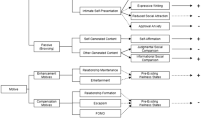Abstract
Cognitive models of social support hypothesize that relatively enduring expectancies about social support influence ongoing social information processing. Drawing from research that suggests that perceived support cognitions are generalized to novel social stimuli, we hypothesized that negative perceptions of the family environment would be generalized to perceptions of new social relations. Incoming freshmen who had moved away to college were assessed in the first week of their first semester on perceived family environment, psychological distress, and a variety of interpersonal person variables (i.e., social skills, agreeableness, and extraversion). Followup measures of perceived support at college were obtained at the end of their first semester. Controlling for social desirability, persons with negative perceptions of their family environments, higher distress, and lower levels of social competence, agreeableness, and extraversion developed lower levels of perceived support than their more fortunate counterparts. In addition, the relation between perceived family environment and developed perceived support did not appear to be mediated by psychological distress or the interpersonal person variables. Implications for understanding the processes by which perceived support is developed in new social settings were discussed.
Similar content being viewed by others
References
Barrera, M., Jr. (1986) Distinctions between social support concepts, measures, and models.American Journal of Community Psychology, 14, 413–445.
Beck, A. T., Steer, R. A., & Garbin, M. C. (1988). Psychometric properties of the Beck Depression Inventory: Twenty-five years of evaluation.Clinical Psychology Review, 8, 77–100.
Burt, C. E., Cohen, L. H., & Bjorck, J. P. (1988). Perceived family environment as a moderator of young adolescents' life stress adjustment.American Journal of Community Psychology, 16, 101–122.
Cohen, S., & Hoberman, H. (1983). Positive events and social supports as buffers of life change stress.Journal of Applied Social Psychology, 13, 99–125.
Cohen, S., Sherrod, D., & Clark, M. (1986). Social skills and the stress-protective role of social support.Journal of Personality and Social Psychology, 50, 963–973.
Cohen, S., & Wills, T. A. (1985). Stress, social support and the buffering hypothesis.Psychological Bulletin, 98, 310–357.
Coyne, J. C. (1976). Depression and the response of others.Journal of Abnormal Psychology, 85, 186–193.
Crowne, D. P., & Marlowe, D. (1964).The approval motive: Studies in evaluative dependence. New York: Wiley.
Gotlib, I. H., & Robinson, L. A. (1982). Response to depressed individuals: Discrepancies between self-report and observer-rated behavior.Journal of Abnormal Psychology, 91, 231–240.
Gurtman, M. B. (1986). Depression and the response of others: Reevaluating the reevaluation.Journal of Abnormal Psychology, 95, 99–101.
Hays, R. B., & Oxley, D. (1986). Social network development and functioning during a life transition.Journal of Personality and Social Psychology, 50, 305–313.
Heller, K. (1979). The effects of social support: Prevention and treatment implications. In A. P. Goldstein & F. H. Kanfer (Eds.),Maximizing treatment gains: Transfer enhancement in psychotherapy (pp. 353–382). New York: Academic Press.
Heller, K., & Swindle, R. W., Jr. (1983). Social networks, perceived social support and coping with stress. In R. D. Felner, L. A. Jason, J. Moritsugu, & S. S. Farber (Eds.),Preventive psychology: Theory, research and practice (pp. 87–103) New York: Pergamon Press.
Heller, K., Swindle, R. W., Jr., & Dusenbury, L. (1986). Component social support processes: Comments and integration.Journal of Consulting and Clinical Psychology, 54, 466–470.
Lakey, B. (1989). Personal and environmental antecedents of perceived social support developed at college.American Journal of Community Psychology, 17, 503–519.
Lakey, B., & Cassady, P. B. (1990). Cognitive processes in perceived social support.Journal of Personality and Social Psychology, 59, 337–343.
Lakey, B., Moineau, S., & Drew, J. B. (1992). Perceived social support and individual differences in the interpretation and recall of supportive behaviors.Journal of Social and Clinical Psychology, 11, 336–348.
Levinson, R. W., & Gottman, J. M. (1978). Toward the assessment of social competence.Journal of Consulting and Clinical Psychology, 46, 453–462.
McRae, R. R., & Costa, P. T. (1987). Validation of the five-factor model of personality across instruments and observers.Journal of Personality and Social Psychology, 52, 81–90.
Monroe, S. M., & Steiner, S. C. (1986). Social support and psychopathology: Interrelations with preexisting disorder, stress and personality.Journal of Abnormal Psychology, 95, 29–39.
Moos, R. H., & Moos, B. S. (1986).Family Environment Scale manual. Palo Alto, CA: Consulting Psychologists Press.
Nunally, J. C. (1978).Psychometric theory (2nd ed). New York: McGraw-Hill.
Pierce, G. R., Sarason, B. R., & Sarason, I. G. (1992). General and specific support expectations and stress as predictors of perceived supportiveness: An experimental study,Jorunal of Personality and Social Psychology, 63, 297–307.
Sarason, B. R., Pierce, G. R., & Sarason, I. G. (1990). Social support: The sense of acceptance and the role of relationships. In B. R. Sarason, I. G. Sarason, & G. R. Pierce (Eds.),Social support: An interactional view (pp. 97–128). New York: Wiley.
Sarason, I. G., Sarason, B. R., & Shearin, E. N. (1986). Social support as an individual difference variables: Its stability, origins and relational aspects.Journal of Personality and Social Psychology, 50, 845–855.
Sechrest, L. B. (1963). Incremental validity: A recommendation.Educational and Psychological Measurement, 23, 153–158.
Spielberger, C. D., Gorsuch, R. L., & Lushene, R. E. (1970).Manual for the State-Trait Anxiety Inventory. Palo Alto, CA: Consulting Psychologists Press.
Wiggins, J. S. (1979). A psychological taxonomy of trait-descriptive terms: The interpersonal domain.Journal of Personality and Social Psychology, 37, 395–412.
Author information
Authors and Affiliations
Rights and permissions
About this article
Cite this article
Lakey, B., Dickinson, L.G. Antecedents of perceived support: Is perceived family environment generalized to new social relationships?. Cogn Ther Res 18, 39–53 (1994). https://doi.org/10.1007/BF02359394
Issue Date:
DOI: https://doi.org/10.1007/BF02359394




